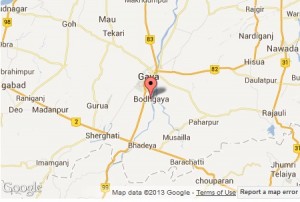Blasts at one of Buddhism’s holiest sites—India police
[wpgmappity id=”1223″]

The Indian government called the blasts a “terror attack” after nine bombs exploded at the complex in Bihar state which attracts Buddhists and other visitors from all over the world.
No one claimed responsibility for the attack, but police said they earlier warned officials that Islamic militants could target the site as revenge for Buddhist violence against Muslims in neighbouring Myanmar.
“Four blasts took place inside the temple complex,” Home Minister Sushil Kumar Shinde told reporters. “Three blasts took place near the Karmapa monastery while one each happened near the Buddha statue and a tourist bus stand outside.”
Two more bombs were found and defused at the complex, one of them near the temple’s celebrated 80-feet-tall (24-meter) statue of the Buddha, the minister said.
Article continues after this advertisementAlong with temples, dozens of monasteries housing monks from around the world are located near the complex, which is believed to contain the tree under which the Buddha reached enlightenment in 531 BC.
Article continues after this advertisement“The holy bodhi tree is safe and there is no damage to it,” Bihar police chief Abhayanand, who goes by one name, told AFP.
Prime Minister Manmohan Singh condemned the blasts at the complex, a UNESCO World Heritage Site, and said that “such attacks on religious places will never be tolerated.”
Junior home minister R.P.N. Singh told reporters “it is clear that this was a terror attack” and teams of investigators were probing the incident.
Police in New Delhi had warned state officials last winter that Islamist militants from the Indian Mujahideen group were planning to attack the complex, an official focused on anti-terror operations told AFP.
“We told state police that the Indian Mujahideen planned to carry out an attack as retaliation for Buddhist violence against Muslims in Myanmar,” the official said on condition of anonymity.
“We told them that Bodh Gaya is a probable target for attack,” he said.
The Indian Mujahideen has admitted carrying out numerous bomb blasts in recent years, and is often listed as a suspect in attacks across the country.
Attacks on Buddhists are rare in India but there have been tensions in the wider region recently following clashes between Buddhists and Muslims in Myanmar, Sri Lanka and Bangladesh.
Additional security forces were deployed to guard the complex after the blasts, which wounded two monks, a 50-year-old Tibetan and a 30-year-old Myanmar national, who were taken to hospital.
Windows were shattered at one of the buildings, while a wooden door at a small temple was destroyed and debris was strewn inside another building.
Sri Lanka Buddhist monk Gomarankadawala Hemarathana, 28, who raced to the scene after the blasts, said one of the bombs had been placed at the base of the statue.
“It is a miracle that the Buddha statue was not harmed. The bomb was placed at the foot of the statue but it did not go off,” he told AFP.
The Bodh Gaya complex, 110 kilometers (68 miles) south of the state capital Patna, is one of the earliest Buddhist temples still standing in India. The first temple was built in the 3rd century BC by the Buddhist Emperor Asoka and the present temples date from the 5th or 6th centuries, according to UNESCO.
The complex houses the holy bodhi tree as well as the giant Mahabodhi statue of Buddha, and multiple shrines marking the places where he is believed to have spent time after his enlightenment.
Tibetan spiritual leader the Dalai Lama makes frequent trips to the complex, which attracts visitors during the peak tourist season from October to March.
After his meditations beneath the tree, Buddha is said to have devoted the rest of his life to teaching and he founded an order of monks before dying aged 80.